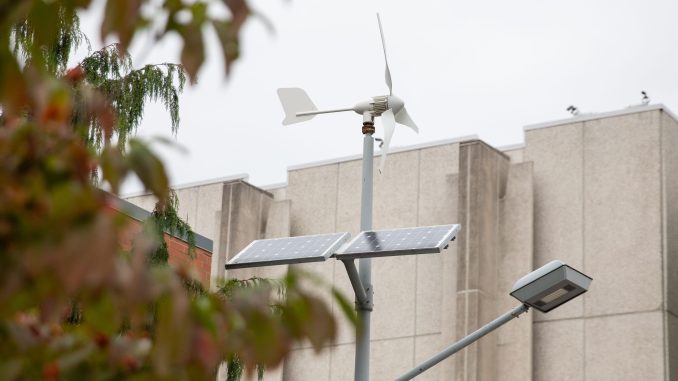
Temple University is expected to spend two percent more on energy for the 2021-22 fiscal year — which began on July 1 and will end on June 30, 2022 — than in the previous fiscal year, wrote Joe Monahan, associate vice president of facilities and operations, in an email to The Temple News.
The increase is attributed to the university’s higher energy use this year, largely because the return of in-person operations has required more heating and cooling in buildings on campus, Monahan said.
Temple saved $4.26 million last year when there were fewer people on campus amid the university’s switch to primarily remote operations during the COVID-19 pandemic. The savings were both the result of Temple using 18 percent less energy in the 2019-20 fiscal year when students and the cost of energy decreased during the COVID-19 pandemic, Monahan said.
“We’re definitely seeing the uptick in energy usage, from the past two years,” Monahan said.
The cost per unit of energy dropped by 3.9 percent in the 2020-21 fiscal year, Monahan wrote.
Energy costs fell by 10 percent worldwide in 2019, due to a decrease in the demand for electricity during the pandemic, according to the International Energy Agency, an organization providing statistics to support solutions encouraging sustainable energy for countries globally.
The decline in demand for non-renewable energy sources caused renewable energy sources to become more expensive during the pandemic, which complicated the university’s goal of incorporating more renewable energy sources on campus, said Rebecca Collins, director of sustainability.
In 2019, the Office of Sustainability joined an agreement with developers to implement a 50-percent increase in renewable energy use on campus, like solar and wind operations. The agreement was put on hold as a result of the pandemic, Collins said.
“The developers that had responded to our request for proposal essentially withdrew their projects and costs,” Collins said. “They weren’t sure how the pandemic was going to affect the market.”
The university plans to reconnect with the developers once the energy market stabilizes in hopes of continuing the off-site agreement, Collins said.
Temple’s Office of Sustainability evaluates the efficiency of its energy use yearly, and still intends to increase the amount of energy derived from sustainable energy systems by 100 kilowatts by 2022. The university has begun exploring opportunities to develop more energy technology systems that will reduce its emissions, according to the 2019-20 Sustainability Annual Report.
One of Temple’s long-term goals is to reduce the total energy usage of buildings on campus by 18 percent by 2030. So far, there has been a six-percent reduction since the 2016-17 fiscal year, according to the report.
While long-term sustainability plans are a work in progress, Temple should consider more solutions for the present, said Veronica Jacome, assistant professor of Geography and Urban Studies.
“Obviously energy efficiency is really important, but so is just making sure we’re not consuming when we don’t need to be,” Jacome said.
For example, Temple can tackle large problems like reducing the amount of energy used for conditioning air — the university’s largest energy use — through small actions, like opening windows on cool days instead of relying on cooling systems, she added.
Temple could also expand its campus green spaces to reduce its reliance on air conditioning and improve building temperature regulation because increased greenery provides more opportunities for shade, Jacome said.
“I think knowing that climate change is going to be around for a long time,” Jacome said. “We have to have solutions for the present, but also thinking a little bit more long term.”



Be the first to comment